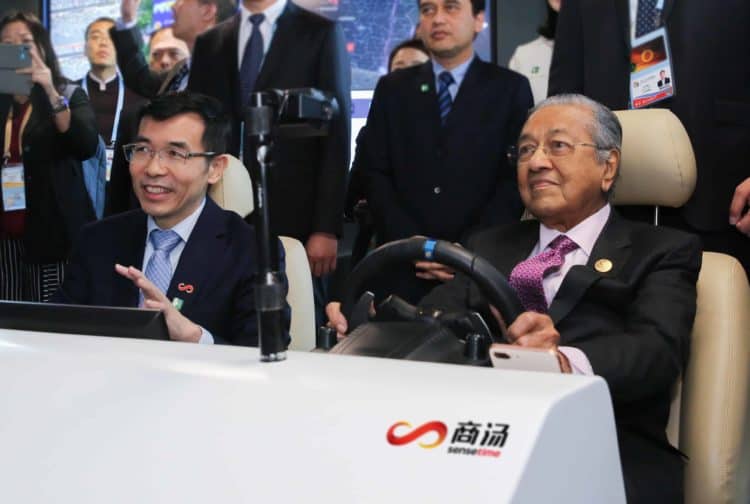Malaysian Prime Minister Dr. Mahathir Mohamad and his delegation visited the Beijing office of China’s AI company SenseTime last week at the sidelines of the 2nd Belt and Road Forum held in the Chinese capital.
The visit was in conjunction with the signing of a strategic collaboration agreement among SenseTime, Malaysian technology company G3 Global Berhad (G3 Global) and China Harbour Engineering Company Ltd (CHEC) to establish the first artificial intelligence (AI) Park in Malaysia.
Before Dr. Mahathir’s visit, the partners announced on April 10, 2019, that they would invest a total of more than US$1 billion over the next five years to establish the park.
It is envisioned as a platform for the development of AI solutions in computer vision, speech recognition, natural language, and humanoid/robot.
“Ultimately, the park will enable the development of technology and talent, data management, research and development and commercial ecosystem which could assist the government to address in data ecosystem and AI governance,” the companies said in a press statement.
SenseTime Founder and Professor of the Chinese University of Hong Kong, Professor Xiao’ou Tang, and SenseTime President of Asia-Pacific Business Group Jeff Shi gave Mahathir and his ministerial officials a tour of the facility for a first-hand view of the AI technologies and applications in autonomous driving, smart city, education, healthcare and other key focus areas.
According to the company, the visit was the second by a head of state from Southeast Asia after Singaporean Prime Minister Lee Hsien Loong’s visit in 2017, according to SenseTime.
Described by Bloomberg “as the world’s largest startup,” SenseTime was founded in 2014 and to date has received total funding of $2.6B in seven rounds.
Focused on computer vision and deep learning technologies, it provides face recognition technology to over 300 companies, including China Mobile Communication Co, China UnionPay, Huawei Technologies Co., Xiaomi, and JD.com.
“SenseTime is honored to be part of Malaysia’s new journey. We look forward to working together with Malaysian government, academia and business sectors, bringing our technological expertise and experience to Malaysia and building a better world with AI technology,” Tang said in a news release after the visit of the Malaysian officials.
AI in Malaysia
The Malaysian government announced plans to develop a National Artificial Intelligence Framework in October 2017. The New Strait Times reported on April 2, 2018 that Malaysia Digital Economy Corporation Sdn Bhd (MDEC) is expecting to complete the development of the framework by year-end to drive the country’s AI ecosystem.
In the AI Readiness Index published by Salesforce and TRPC, Malaysia ranked fourth in Asia-Pacific in overall AI readiness with a score of 49/100. Singapore (score: 63.0) leads the region, followed by Hong Kong (56.5) and India (50.2).
The report noted that Malaysia ranks highest in terms of venture capital availability and second-to-last in the number of AI start-ups.
“The AI park will serve as the main hub for industry players and talents to be trained on AI and machine learning with cutting-edge facilities and physical infrastructure for education, training, research, development and deployment,” he said.
“With the AI park, I believe Malaysia will be a step closer in realizing the vision to be ranked within the top 30 of the Global Innovation Index ranks by 2025,” he added.
The country currently ranks 35th in the index.
G3 Global was founded in 1992 as an apparel brand marketing jeanswear under the brand name GA Blue. In 2016, Malaysian telecommunications and media player Green Packet Berhad acquired a stake in the company and started the group’s journey into the ICT business.
The business today specializes on Internet of Things (IoT) solutions and AI, providing services such as connected devices, cloud-based data-driven applications for connected vehicles, public safety surveillance, face recognition access control, and LoRa technologies, among others.
Going forward
Under the partnership agreement signed by the three companies, CHEC, an engineering contractor and a subsidiary of China Communications Construction Company, will provide infrastructure engineering and construction services.
Founded in 1980, it has been exploring the overseas market as a contractor and investor since its establishment.
While there is no new big investment announcements at the recently concluded Belt and Road Forum in Beijing, the forum released a joint declaration covering economic corridors and projects that will be pursued going forward.
The list includes the China-Malaysia Qinzhou Industrial Park and the Malaysia-China Kuantan Industrial Park.



